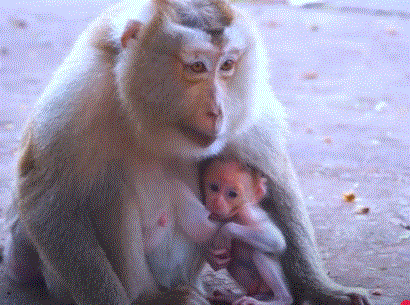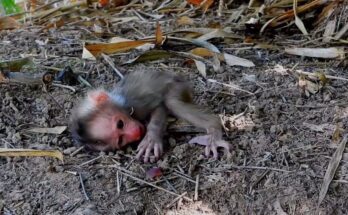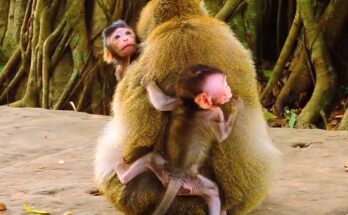The morning sun filtered softly through the ancient stone towers of Angkor Wat, painting the forest floor in streaks of gold and green. The air shimmered with warmth, and the gentle calls of distant birds echoed like whispers from another time. That’s when I saw her — Mama Pinka, one of the most graceful monkeys of the temple forest, her baby Parker clinging tightly to her chest.
At first glance, it was a simple scene: a mother grooming her child, a few playful jumps, and a tender gaze exchanged between two beings who shared more than blood — they shared instinct, love, and trust. But as I watched closer, I realized this wasn’t just another morning. This was a quiet dance of care, patience, and devotion — a story of life unfolding in its most natural form.

Pinka moved with purpose — her eyes sharp, her movements measured. Each touch of her hand across Parker’s soft fur wasn’t just grooming; it was teaching. It was as if she was showing her little one how to exist — how to be gentle yet alert, curious yet cautious. Parker, still unsteady on his tiny legs, tried to mimic every move, his tail twitching with determination. The forest seemed to smile at their exchange.
There’s something indescribably moving about witnessing such moments — when nature slows down enough for you to feel its heartbeat. The ruins of Angkor, once home to kings and temples, now serve as silent witnesses to these everyday miracles of motherhood. Watching Pinka guide Parker through each new discovery — a leaf, a stone, a curious insect — reminded me of every mother I’ve ever seen, human or otherwise, who teaches not through words but through love and patience.
At one point, Parker stumbled — his tiny fingers losing grip on a branch slick with morning dew. He let out a small squeak, eyes wide in panic. Before I could even blink, Pinka’s arms were around him, her face pressed close, murmuring soft, almost human-like sounds. She didn’t scold him. She didn’t rush him back to play. She just held him, letting him feel safe again. That single act — that gentle embrace — carried more tenderness than a thousand words could ever describe.
As the day went on, Pinka led Parker to the temple steps, where other monkeys played and foraged. She let him wander but never too far, always glancing back, always listening. Sometimes, Parker would stop, look up at her, and make a tiny chirping noise — as if saying, “I’m still here, Mama.” And Pinka would respond with a soft hum, the kind that could melt even the coldest heart.
In that simple call and response, I saw the essence of love — a rhythm older than any civilization that ever stood here.
When the afternoon light began to fade, turning the moss-covered stones amber, Pinka settled near a quiet pond. Parker nestled against her chest, his eyelids fluttering, the day’s adventures weighing down his tiny body. She cradled him close, her hand stroking his back in slow, loving motions, as if promising him the world would always be kind as long as she was near.
I watched them until the forest fell silent. The cicadas quieted, the wind softened, and for a moment, time itself seemed to bow in reverence. I realized then that every heartbeat in that forest carried a story — stories of mothers and children, of protection and learning, of love expressed in silence.
That’s what makes the bond between Pinka and Parker so timeless. It reminds us that love — real, unconditional love — doesn’t need translation. Whether in the arms of a human or the embrace of a monkey beneath ancient trees, the language of care is universal.
Before leaving, I looked back one last time. Pinka was asleep, her arms wrapped around Parker, both their chests rising and falling in perfect unison. The ancient temple loomed behind them — eternal, like their love.
And I thought to myself, perhaps this is what peace looks like.


